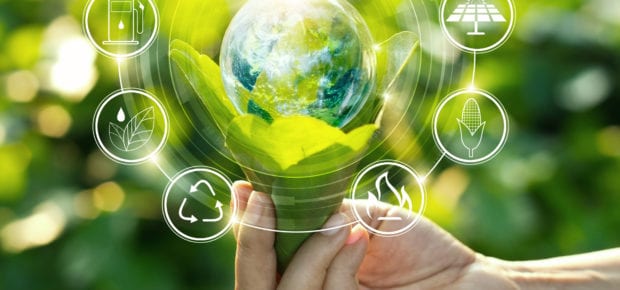May 23, 2019
 IEEE Senior member Charles Despins is the Co-Chair of the IEEE Sustainable ICT initiative and Vice President of research, partnerships and faculty affairs at École de technologie supérieure (ETS) at the Université du Québec.
IEEE Senior member Charles Despins is the Co-Chair of the IEEE Sustainable ICT initiative and Vice President of research, partnerships and faculty affairs at École de technologie supérieure (ETS) at the Université du Québec.
Information and communications technology (ICT) encompasses the tools and networks used to create, store and share information. That includes computers, the internet, telecommunications and broadcasting technologies.
With the rapid rate of change in all things internet-related, ICT is consistently at the center of the technology conversation. New device turnover raises the question of how to make the relatively short life cycle of phones and computers more sustainable.
To that end, we talked with Charles Despins, professor at the Université du Québec and co-chair of the IEEE Sustainable ICT initiative, about the direction of the initiative and its implications on everything from e-waste to environmental and social sustainability at large.
Q (IEEE): In the simplest terms, what does the IEEE Sustainable ICT initiative do, and why is it an important part of the sustainability conversation?
A (Despins): Information and communications technology (ICT) (and the so-called digital revolution in a broader sense) are a double-edged sword in terms of building a sustainable future.
On one hand, ICT’s energy consumption and carbon footprint have grown substantially in recent decades. This has been a result of the development of networks, increased usage and non-renewable energy sources powering (at least partly) these ICT infrastructures. ICT life-cycle management also remains a challenge, exemplified by a growing e-waste problem.
On the other hand, detailed studies have shown that widespread adoption of ICT solutions in various industries could enable the elimination of 20% of the world’s greenhouse gas emissions, as well as substantially contribute to the achievement of at least half of the United Nations’ sustainable development goals. This sustainability through ICT depends on achieving sustainability in ICT, addressing issues like those just raised.
The Sustainable ICT initiative has contributed to this huge endeavor by developing new IEEE standards and raising awareness through publications, webinars and events, such as our summits. Nine new IEEE standards are currently in the final stages of development and address network energy efficiency as well as carbon footprint. Our events also seek to break down silos between IEEE societies, and between the technology community and policymakers. This holistic approach is essential to achieving sustainability through ICT.
Q: What do you see as the biggest potential determinant in the next 10 years as to whether ICT can lead us to a more sustainable future?
A: Over the last decade, the ICT industry has made great strides on the “sustainability in ICT” front (improved energy efficiency is a good example). Much more needs to be done, but the process is engaged.
Going forward, with ICT gradually immersing itself in every industry and area of human activity, “sustainability through ICT” is a huge opportunity but also a daunting challenge. It requires a much stronger dialogue and concerted actions between the technology and ICT industry community, the other industry sectors that use ICT and public policy makers. With respect to the latter, this means engaging at the national government level but also at regional and municipal levels. Notably, when we talk about “smart” cities, “smart” must also mean “sustainable.”
Q: Since the first Sustainable ICT Summit, what have been the biggest strides in making sustainability a part of the ICT conversation?
A: A 50-page white paper was produced as a result of the first IEEE Sustainable ICT Summit in Paris, France, in October 2017. The white paper lists a summary of 16 industry and policy challenges ranging from sobriety in software engineering to joint industry – government incentives for users of ICT. We look forward to expanding the conversation at this year’s summit, June 18th and 19th in Montreal, Canada.
Q: What are the social impacts of a more sustainable information and communication technology industry? What does success look like?
A: Further in this 21st century, the social impacts of sustainable ICT will range from clean, healthy and prosperous communities to individuals fully empowered to pursue their own goals. However, at the current time, as we discuss 5G, 6G and novel applications, just under 50% of the world’s population does not even have access to the internet. In this respect, there is a rich-and-poor-country digital divide as well as an urban-rural divide in many developed countries. As engineers, we must engage at the local level to make our own communities smarter and more sustainable. Much of the positive impacts of sustainable ICT will come from the bottom up instead of the top down.
The digital revolution is a reality, and as IEEE members we are major contributors to its development. In the spirit of IEEE’s mission statement “advancing technology for humanity”, it is also up to us to reach beyond our professional communities in order to steer this revolution in the direction of sustainability.





 Meaningful Momentum or Running in Place?
Meaningful Momentum or Running in Place? AI Through Our Ages
AI Through Our Ages Liquid Infrastructure: Our Planet's Most Precious Resource
Liquid Infrastructure: Our Planet's Most Precious Resource The Impact of Technology in 2025
The Impact of Technology in 2025 Quantum and AI: Safeguards or Threats to Cybersecurity?
Quantum and AI: Safeguards or Threats to Cybersecurity? Why AI Can't Live Without Us
Why AI Can't Live Without Us Bits, Bytes, Buildings and Bridges: Digital-Driven Infrastructure
Bits, Bytes, Buildings and Bridges: Digital-Driven Infrastructure Impact of Technology in 2024
Impact of Technology in 2024 Emerging AI Cybersecurity Challenges and Solutions
Emerging AI Cybersecurity Challenges and Solutions The Skies are Unlimited
The Skies are Unlimited Smart Cities 2030: How Tech is Reshaping Urbanscapes
Smart Cities 2030: How Tech is Reshaping Urbanscapes Impact of Technology 2023
Impact of Technology 2023 Cybersecurity for Life-Changing Innovations
Cybersecurity for Life-Changing Innovations Smarter Wearables Healthier Life
Smarter Wearables Healthier Life Infrastructure In Motion
Infrastructure In Motion The Impact of Tech in 2022 and Beyond
The Impact of Tech in 2022 and Beyond Cybersecurity, Technology and Protecting Our World
Cybersecurity, Technology and Protecting Our World How Technology Helps us Understand Our Health and Wellness
How Technology Helps us Understand Our Health and Wellness The Resilience of Humanity
The Resilience of Humanity Harnessing and Sustaining our Natural Resources
Harnessing and Sustaining our Natural Resources Creating Healthy Spaces Through Technology
Creating Healthy Spaces Through Technology Exceptional Infrastructure Challenges, Technology and Humanity
Exceptional Infrastructure Challenges, Technology and Humanity The Global Impact of IEEE's 802 Standards
The Global Impact of IEEE's 802 Standards Scenes of our Cyber Lives: The Security Threats and Technology Solutions Protecting Us
Scenes of our Cyber Lives: The Security Threats and Technology Solutions Protecting Us How Millennial Parents are Embracing Health and Wellness Technologies for Their Generation Alpha Kids
How Millennial Parents are Embracing Health and Wellness Technologies for Their Generation Alpha Kids Space Exploration, Technology and Our Lives
Space Exploration, Technology and Our Lives Global Innovation and the Environment
Global Innovation and the Environment How Technology, Privacy and Security are Changing Each Other (And Us)
How Technology, Privacy and Security are Changing Each Other (And Us) Find us in booth 31506, LVCC South Hall 3 and experience the Technology Moon Walk
Find us in booth 31506, LVCC South Hall 3 and experience the Technology Moon Walk Virtual and Mixed Reality
Virtual and Mixed Reality How Robots are Improving our Health
How Robots are Improving our Health IEEE Experts and the Robots They are Teaching
IEEE Experts and the Robots They are Teaching See how millennial parents around the world see AI impacting the lives of their tech-infused offspring
See how millennial parents around the world see AI impacting the lives of their tech-infused offspring Take the journey from farm to table and learn how IoT will help us reach the rising demand for food production
Take the journey from farm to table and learn how IoT will help us reach the rising demand for food production Watch technical experts discuss the latest cyber threats
Watch technical experts discuss the latest cyber threats Explore how researchers, teachers, explorers, healthcare and medical professionals use immersive technologies
Explore how researchers, teachers, explorers, healthcare and medical professionals use immersive technologies Follow the timeline to see how Generation AI will be impacted by technology
Follow the timeline to see how Generation AI will be impacted by technology Learn how your IoT data can be used by experiencing a day in a connected life
Learn how your IoT data can be used by experiencing a day in a connected life Listen to technical experts discuss the biggest security threats today
Listen to technical experts discuss the biggest security threats today See how tech has influenced and evolved with the Games
See how tech has influenced and evolved with the Games Enter our virtual home to explore the IoT (Internet of Things) technologies
Enter our virtual home to explore the IoT (Internet of Things) technologies Explore an interactive map showcasing exciting innovations in robotics
Explore an interactive map showcasing exciting innovations in robotics Interactively explore A.I. in recent Hollywood movies
Interactively explore A.I. in recent Hollywood movies Get immersed in technologies that will improve patients' lives
Get immersed in technologies that will improve patients' lives